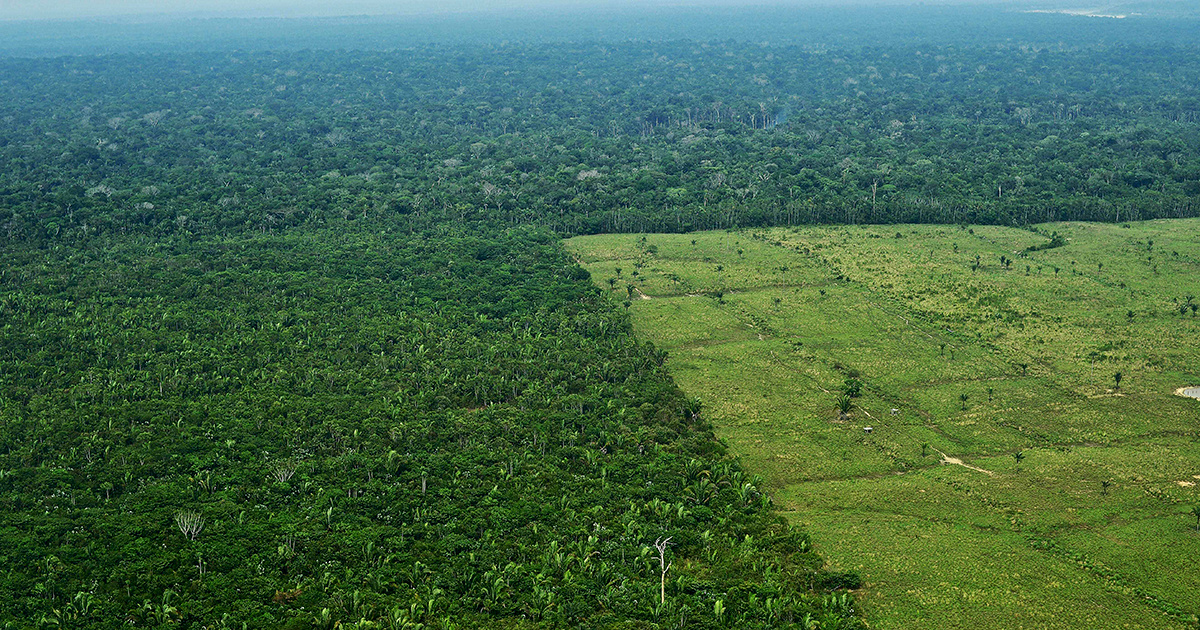
Amazon Deforestation Rate Hits 3 Football Fields Per Minute, Data Confirms

Aerial view of deforestation in the Western Amazon region of Brazil on Sept. 22, 2017. CARL DE SOUZA / AFP / Getty Images
The Amazon rainforest in Brazil is being clear cut so rapidly — a rate of three football fields per minute — that it is approaching a “tipping point” from which it will not recover, according to the Guardian.
As trees are lost, researchers said there is a risk that large areas could transition from rainforest to savannah as they lose the ability to make their own rainfall from evaporation and from plants giving off water vapor, according to Newsweek.
A transition on that scale could have significant implications for global warming since the rainforest absorbs vast amounts of atmospheric carbon. Recent research has shown the potential for massive tree plantings to remove excess carbon from the atmosphere.
“It’s very important to keep repeating these concerns. There are a number of tipping points which are not far away,” said Philip Fearnside, a professor at Brazil’s National Institute of Amazonian Research, as the Guardian reported. “We can’t see exactly where they are, but we know they are very close. It means we have to do things right away. Unfortunately that is not what is happening. There are people denying we even have a problem.”
The alarming rate of deforestation and its acceleration confirms suspicions that new president Jair Bolsonaro has allowed illegal land invasion, logging and burning. Bolsonaro has called his own government’s satellite data lies. The president’s comments followed preliminary satellite data that showed more than 400 square miles of the rainforest had been cleared in the first half of July — an increase of 68 percent from the entire month of July last year, according to the BBC.
Bolsonaro, the far right politician who has said he is fulfilling a mission from God, dismissed concerns expressed by European Union members and called it hypocritical since so many European forests have been wiped out.
“You have to understand that the Amazon is Brazil’s, not yours,” Bolsonaro said, as the Guardian reported. “If all this devastation you accuse us of doing was done in the past the Amazon would have stopped existing, it would be a big desert.”
The DETER-B satellite system that the Brazilian government started to use in 2015 to track deforestation has shown that the record setting July deforestation is on pace to clear enough forest to fit New York City twice by the end of the month.
The DETER satellite data is considered preliminary. Detailed figures are released at the end of the year when data from other satellites and observatories is also collected, according to Newsweek.
“Unfortunately, it is absurd, but it should not catch anyone by surprise. President Jair Bolsonaro and minister Ricardo Salles are dismantling our socio-environmental policies,” said Carlos Rittl, the executive secretary of the Climate Observatory, an NGO formed by a coalition of environmental groups, as the Guardian reported.
After years of conservation, Brazil’s environmental track record has nose-dived in the first seven months of Bolsonaro’s administration. He has given environmental oversight to the agriculture minister, who is the leader of a farming lobby. His foreign minister called climate science a part of a global Marxist plot. The government has invited businesses to register land counter-claims in areas that are protected nature reserves, indigenous territories and areas dedicated to sustainable production by native forest people, according to the Guardian.
- Brazilian President Jair Bolsonaro Will No Longer Be Honored at ...
- Brazil's Bolsonaro Green-Lights 150+ Pesticides This Year - EcoWatch
- Palm Oil Importers Won't Meet Zero Deforestation Goals by 2020 ...
- Data Find Rainforests Lost 14,000 Square Miles in 2019 - EcoWatch
- To Stop Amazon Deforestation, Brazilian Groups Take Bolsonaro to Court - EcoWatch
- Dinosaur-Killing Asteroid Probably Created Amazon Rainforest

 233k
233k  41k
41k  Subscribe
Subscribe 